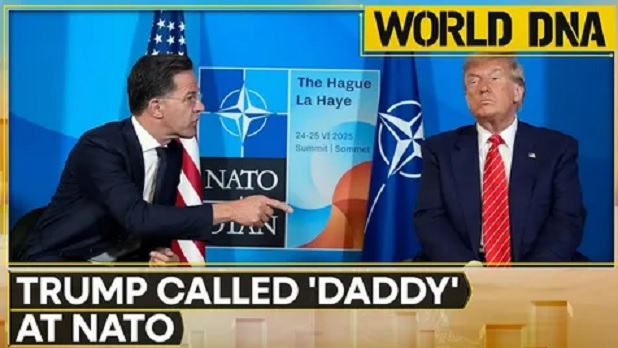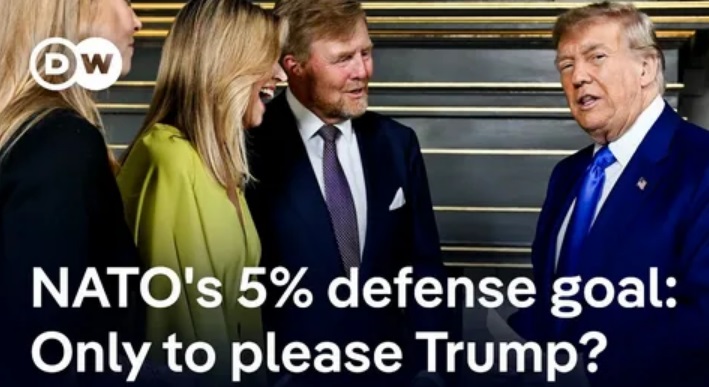
In the first half of the twentieth century, Europe was the most militarized and violent region on the planet. By the early twenty-first, it had become the least militarized and least violent, a model of peace, cooperation, and transnational integration, ‘Foreign Affairs’ notes.
The post-World War II order was founded on a central bargain: the United States would use its extraordinary power to provide international public goods such as peace, security, and an increasingly open global economic system, and Europe, Japan, and other allies would bandwagon with Washington rather than balance against it. Although generations of U.S. policymakers tried to get other NATO members to contribute more to their own defense, they stuck with the bargain even when those partners refused because the broad benefits the United States received from consensual hegemony outweighed the costs and risks of securing it.
The second Trump administration is no longer convinced of that. It has raised old concerns about burden sharing with a new urgency and a new antipathy, bluntly telling U.S. allies that they need to renegotiate the bargain or else. For the first time in three-quarters of a century, it is now an open question whether the United States will continue to shoulder much of the burden of providing for European security — and how other members of NATO would react if Washington stopped doing so.
As soon as he was back in the White House, Trump started coercing Washington’s closest allies, musing on a number of occasions about seizing territory from NATO members such as Canada and Denmark. His administration detained innocuous European travelers as part of a crackdown on immigration and gutted funding for foreign aid, democracy promotion, international education, science and public health, environmental protection, and other instruments of American soft power, all while trying to extend control over the rest of the U.S. government and civil society.
Trump launched a massive trade war against the entire world, threatening to destroy the global economy unless other countries agreed to pay tribute. And he seemed to switch sides in the war in Ukraine, temporarily cutting off military and intelligence support to Kyiv, demanding repayment for past aid, and berating Ukrainian Zelensky, even as he praised Russian President Vladimir Putin and supported Russia everywhere from cyberspace to the United Nations.
The relationship among NATO members will never be quite the same.
European policymakers failed to take the threat of American abandonment seriously in the past. They are determined not to make the same mistake again. Even as they try to muddle through the current crisis, therefore, they are taking small steps to hedge — steps that could lead to large consequences down the road.
One example is the creation, last fall, of a European commissioner for defense and space. The European Union has always been a peaceful project, with security matters left to individual countries and to NATO. But although the European Commission does not have its own army or weapons, it can nevertheless shape how its members organize their defense, and it is now starting to do so. The new commissioner, Andrius Kubilius, is arguing for the use of “buy local” requirements and different kinds of investment guarantees, to create financial incentives for European governments to purchase European-made materiel; nudging them to help firms set up flexible intra-European supply chains for equipment, such as drones or munitions; and organizing joint procurement packages that lower costs and increase interoperability. Such measures may not sound like much, but over time they could become the building blocks of a serious European defense industrial base that depends much less on the United States.
U.S. allies are suddenly realizing that the world is more realist than they had assumed and that contracting out security to Washington has left them vulnerable and marginalized. Trump is finding that deeply rooted institutions and procedures of international cooperation are harder to discard or bypass than he thought and that going it alone can involve costs as well as benefits. It remains unclear how sustainable this situation is, or whether it will eventually move decisively one way or another.
Unless Trump returns to a more conventional American foreign policy, the gulf between Washington and its allies will continue to grow even as attacks on the liberal order multiply. In the best-case scenario, Europeans will pull themselves together over time into an effective geopolitical and geoeconomic force that is assertive, self-confident, and capable. They would make good use of the assets available within the European Union and their connections with allies such as Australia, Canada, Japan, Norway, South Korea, Turkey, and the United Kingdom. European policymakers are now laying the foundations of this future. In it, the United States would shoulder fewer burdens but also exercise less influence.
If Trump continues on his current track and European countries fail to coalesce, the alliance’s toxic codependence will only get worse. Token or divided European rearmament efforts would not provide for continent-wide security needs or deter future Russian aggression. Financial and economic interdependence would still tie the United States to European security, but Washington would be increasingly unwilling to pay for it. China’s attempts to take advantage of this dispute by deepening its presence in Europe would be a constant source of tension. Power vacuums would emerge in the Middle East and Africa.

Trump has insisted NATO countries hit the five-percent bar – well beyond the current two percent baseline level currently required by the alliance, notes ‘Economic Times’.
What does NATO's 5% spending deal really mean?
Only a handful of allies – such as Poland and the Baltic states – are coming close to five percent at the moment, with the United States itself under 3.4 percent in 2024.
NATO's 32 nations have thrashed out a compromise deal to dedicate 3.5 percent to core military needs by 2035, and 1.5 percent to broader "defence-related" areas such as cybersecurity and infrastructure.
That gives Trump the win he craves while granting cash-strapped European governments some wiggle room.
Nevertheless, it is still a major ask for many governments and will add hundreds of billions to budgets in the coming years.
3.5 percent on what?
The bulk of the spending is still required to go on NATO's key focus area: raw military might.
Alliance members last month signed up to new targets for all the hardware they need to face off against the threat from Russia.
The exact details are secret but it will involve the biggest ramp-up in capabilities since the Cold War.
NATO chief Mark Rutte said it envisions a five-fold increase in the alliance's air defences and adding thousands more tanks and armoured vehicles to arsenals.
Countries will also likely keep counting the billions of dollars in military aid they give to Ukraine in this category.
And the 1.5 percent?
The rest of the pledge covers a far broader array of areas from bridges and roads, to cybersecurity.
NATO says these items – while not immediately evident – are also crucial to helping defend against any attack.
"If you can't get tanks to the front lines because the roads or bridges or rail can't handle those tanks and their weight, then obviously they're worthless," US NATO ambassador Matthew Whitaker said.
NATO officials admit that much of this spending will already be on the books of national governments – and will just need to be redesignated.
Italy for instance has said it believes a long-planned bridge it wants to build linking Sicily to mainland should fall under that category.
…Ensuring countries stick to the deal is a key element, as previous NATO pledges have often not been respected.
Now countries will have to submit reports each year to NATO showing that they are stepping up and buying what is needed.
There will also be a review of sorts in 2029 when NATO comes up with new targets for arms needed and the demands could be adjusted.
And looming over everyone's shoulder if they don't make good on their promise will be the unpleasant prospect of upsetting Trump.
read more in our Telegram-channel https://t.me/The_International_Affairs

 11:28 27.06.2025 •
11:28 27.06.2025 •






















